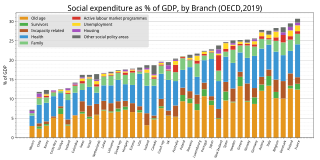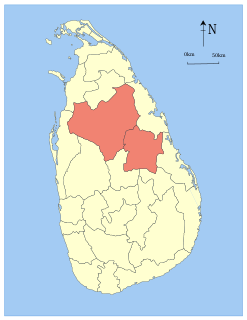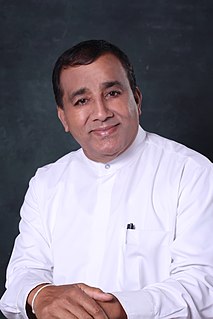
A welfare state is a form of government in which the state protects and promotes the economic and social well-being of its citizens, based upon the principles of equal opportunity, equitable distribution of wealth, and public responsibility for citizens unable to avail themselves of the minimal provisions for a good life.

Welfare, or commonly social welfare, is a type of government support intended to ensure that members of a society can meet basic human needs such as food and shelter. Social security may either be synonymous with welfare, or refer specifically to social insurance programs which provide support only to those who have previously contributed, as opposed to social assistance programs which provide support on the basis of need alone. The International Labour Organization defines social security as covering support for those in old age, support for the maintenance of children, medical treatment, parental and sick leave, unemployment and disability benefits, and support for sufferers of occupational injury.

Islam is the third largest religion in Sri Lanka with about 9.7 percent of the total population. The main Muslim concentrations occur in Eastern Province. In other areas, such as in the cities of the western, north western and central Sri Lanka, Muslims form a segment of the non-rural population. The Muslims usually speak Tamil language in Sri Lanka.

North Central Province is one of the nine provinces of Sri Lanka, the first level administrative division of the country. The provinces have existed since the 19th century but did not have any legal status until 1987 when the 13th Amendment to the Constitution of Sri Lanka established provincial councils. The province is the largest by size, and second least populated in the country. The province consists of the districts of Anuradhapura and Polonnaruwa, both of which were important ancient Sri Lankan kingdoms. The climate is semi-arid, and the forests are dry evergreen forests.

Sri Lankabhimanya Ahangamage Tudor Ariyaratne is a Sri Lankan founder and president of the Sarvodaya Shramadana Movement in Sri Lanka. He was nominated to the Constitutional Council as a civil representative on 10 September 2015. He received the Jamnalal Bajaj Award in 1991.

Indian Tamils of Sri Lanka are Tamil people of Indian origin in Sri Lanka. They are also known as Malayaga Tamilar, Hill Country Tamils, Up-Country Tamils or simply Indian Tamils. They are partly descended from workers sent from South India to Sri Lanka in the 19th and 20th centuries to work in coffee, tea and rubber plantations. Some also migrated on their own as merchants and as other service providers. These Tamil speakers mostly live in the central highlands, also known as the Malayakam or Hill Country yet others are also found in major urban areas and in the Northern Province. Although they are all termed as Tamils today, some have Telugu and Malayalee origins as well as diverse South Indian caste origins. They are instrumental in the plantation sector economy of Sri Lanka. In general, socio-economically their standard of living is below that of the national average and they are described as one of the poorest and most neglected groups in Sri Lanka. In 1964 a large percentage were repatriated to India, but left a considerable number as stateless people. By the 1990s most of these had been given Sri Lankan citizenship. Most are Hindus with a minority of Christians and Muslims amongst them. There are also a small minority followers of Buddhism among them. Politically they are supportive of trade union-based political parties that have supported most of the ruling coalitions since the 1980s.
Sri Lankan Australians are people of Sri Lankan heritage living in Australia; this includes Sri Lankans by birth and by ancestry. Sri Lankan Australians constitute one of the largest groups of Overseas Sri Lankan communities and are the largest diasporic Sri Lankan community in Oceania. Sri Lankan Australians consist of people with Sinhalese, Tamil, Moor, Burgher, Malay and Chinese origins among others.
The caste systems in Sri Lanka are social stratification systems found among the ethnic groups of the island since ancient times. The models are similar to those found in Continental India, but are less extensive and important for various reasons, although the caste systems still play an important and at least symbolic role in religion and politics. Sri Lanka is often considered to be a casteless or caste-blind society by Indians.

Viduthalai Chiruthaigal Katchi formerly known as the Dalit Panthers of India or the Dalit Panthers Iyyakkam is an Indian social movement and political party that seeks to combat caste based discrimination, active in the state of Tamil Nadu. The party also has a strong emphasis on Tamil nationalism. Its chairman is Thol. Thirumavalavan, a lawyer from Chennai and its general secretary is the writer Ravikumar.
Tan Sri Devaki Ayathurai Krishnan is a Malaysian politician. She became the first woman be elected to public office in Malaysia when she won a seat on the Municipal Council in Kuala Lumpur in 1952. She is currently a life member of the Malaysian Indian Congress (MIC).
Kotha Raghuramaiah was an Indian politician who served as a Member of Parliament and Cabinet Minister of Parliamentary Affairs.
Suri Ratnapala is an Australian academic. He is Emeritus Professor of Public Law of the University of Queensland in Brisbane, Australia.
Social class in Sri Lanka is often described as casteless, though caste is still found on the island in both a symbolic and a practical sense. Caste is also used in an analogous sense to refer to the new social class divisions that have appeared in recent decades. The combination of ethnic nationalist movements that saw caste as an island-wide dividing tool, strong emphasis on providing access to education and healthcare regardless of background, and historic lack of discrimination among the colonial civil service played a factor in eradicating the caste system in most sectors of the island's society. Although the Buddhist culture actively fought against all forms of class discrimination, many Buddhist organizations used caste as a method to extract surplus from temple property.
Boddhiya Baduge Dilan Priyanjan Anslam Perera, MP is a Sri Lankan politician. Current Member of Parliament for Badulla District, he was the former State Minister of Highways, State Minister of Housing and Samurdhi, Non-Cabinet Minister of Port Development, and Deputy Minister of Justice.

Weerasangilige Wimal Weerawansha is a Sri Lankan politician, Member of Parliament and leader of the National Freedom Front (NFF). He is the Minister of Industries since 2020. He was the Minister of Small & Medium Business and Enterprise Development, Industries and Supply chain Management from 2019 to 2020, the Minister of Housing and Social Welfare in 2018 and the Minister of Construction and Housing from 2010 to 2015.

Lucky Dissanayake Jayawardana is a Sri Lankan politician who is a member of parliament United National Party for Kandy District and also the minister of city planning, water supply and higher education.

Dehiwala-Mount Lavinia Municipal Council (DMMC) is the local authority for the city of Dehiwala-Mount Lavinia in Sri Lanka. The Council is responsible for providing a variety of local public services including roads, sanitation, drains, housing, libraries, public parks and recreational facilities. It has 48 members elected under the mixed electoral system where 60% of members will be elected using first-past-the-post voting and the remaining 40% through closed list proportional representation.
Sexual minorities in Sri Lanka have been counted in recent times as consisting of as little as 0.035% of the population to as high as 19.6%. It is likely that there are around 1,100,000 according to current mapping conventions.

The third Sirisena cabinet was a short-lived central government of Sri Lanka led by President Maithripala Sirisena during the 2018 constitutional crisis.










